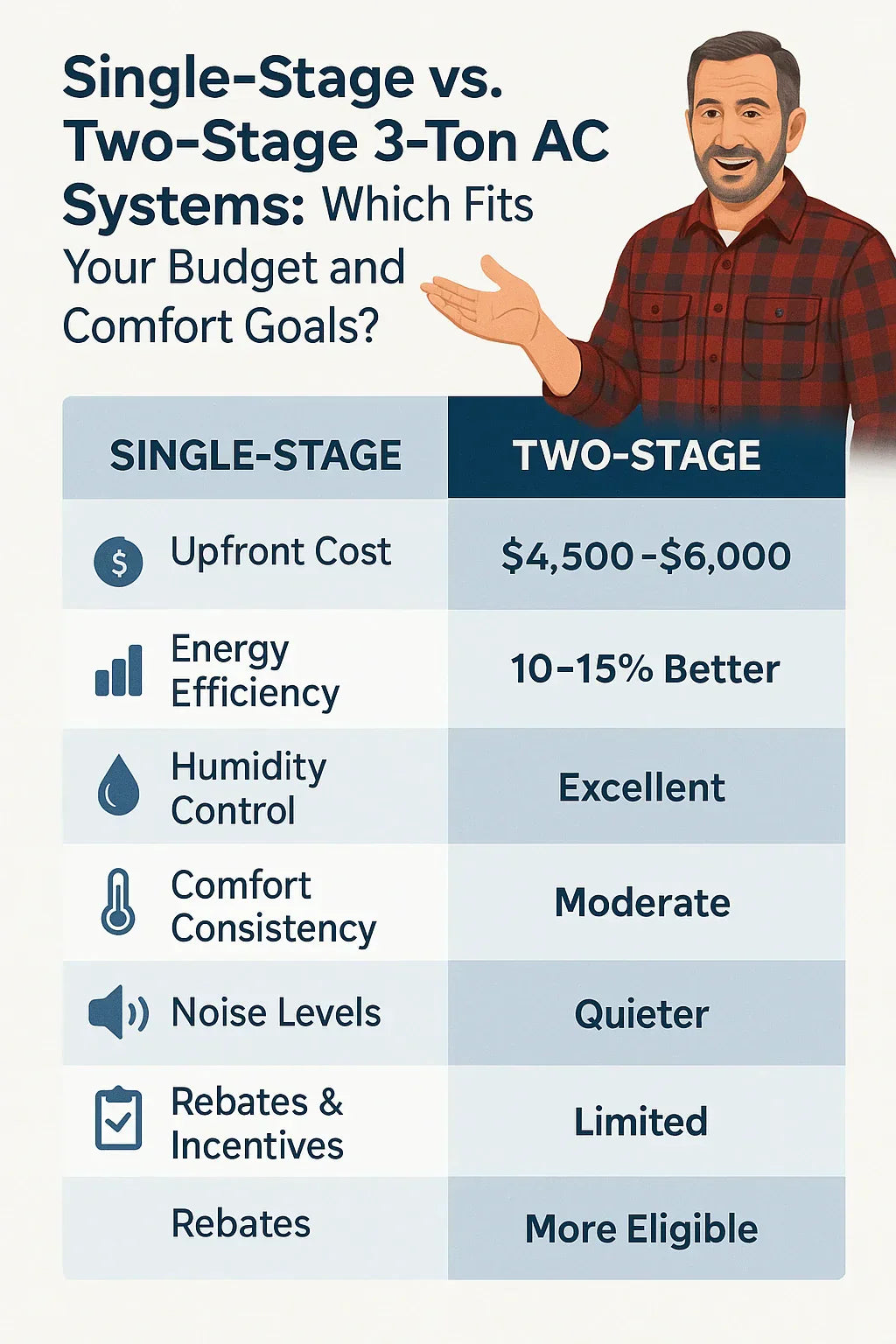📌 Why Staging Matters for Your 3-Ton AC in 2025
Buying a new air conditioning system isn’t just about picking the right tonnage. Staging technology—single-stage vs. two-stage—directly impacts your comfort, utility bills, and long-term satisfaction.
With 3-ton AC systems being the sweet spot for many homes (typically 1,500–2,000 sq ft), the choice between single-stage and two-stage has never been more important. And in 2025, with energy standards rising, rebates available, and new refrigerants like R-32 entering the market, making the right decision now can save you thousands later.
👉 Let’s break it down so you know which system matches both your budget and comfort goals.
🔹 What Exactly Is a Single-Stage AC System?
🛠️ How It Works
A single-stage AC system operates in only one mode: 100% capacity. When your thermostat calls for cooling, the compressor kicks on full blast until the set temperature is reached, then it shuts off.
✔️ Benefits
-
Lower upfront cost
-
Simpler design → fewer parts to break
-
Quick installation and easier servicing
❌ Drawbacks
-
Less efficient due to constant on/off cycling
-
More humidity left in the air, especially in humid climates
-
Temperature swings: feels cool while running, then warms quickly when off
🔹 What About a Two-Stage AC System?
🛠️ How It Works
A two-stage AC system has two operating speeds:
-
Low stage (~60–70% capacity) for mild weather
-
High stage (100% capacity) for hot, peak-demand days
It runs longer at low capacity, keeping the home consistently cool while using less energy.
✔️ Benefits
-
Better humidity control (longer runtime means more moisture removed)
-
More consistent temperatures → fewer hot/cold spots
-
Quieter operation at low stage
-
Higher SEER2 ratings (energy efficiency)
❌ Drawbacks
-
Higher upfront cost
-
More complex = slightly higher maintenance potential
💰 Budget Considerations: Upfront vs. Lifetime Costs
📉 Single-Stage: Budget-Friendly Now
-
Installed cost: $4,500–$6,000
-
Repair costs typically lower
-
Good choice for moderate climates & tighter budgets
📈 Two-Stage: Investment in Comfort & Savings
-
Installed cost: $6,500–$9,000
-
Energy savings: 10–15% annually (Trane)
-
Eligible for federal tax credits and local rebates (ENERGY STAR)
👉 Example: A 2,000 sq ft home in a warm climate might save $80–$150 per year with a two-stage vs. single-stage system. Over 15 years, that’s $1,200–$2,250 saved—often offsetting the higher initial cost.
🌡️ Day-to-Day Comfort Differences
🌞 With a Single-Stage AC
-
All-or-nothing cooling: You’ll notice temperature swings
-
More humid, clammy air in summer
-
Louder operation when the compressor kicks on
❄️ With a Two-Stage AC
-
Runs longer at low power = steady, even cooling
-
Removes more humidity, making 75°F feel like 72°F
-
Quieter → better for bedrooms and living areas
-
Less wear and tear from constant cycling
🏠 Which Type Fits Your Home?
| Home Type | Best Choice | Why |
|---|---|---|
| 🏡 Small homes (<1,600 sq ft) | Single-Stage | Lower cost, adequate comfort |
| 🏠 Medium homes (1,600–2,200 sq ft) | Two-Stage | Balances comfort & cost |
| 🌞 Hot/humid climates | Two-Stage | Superior humidity control |
| 🏔️ Moderate/cool climates | Single-Stage | Lower run times keep cost down |
| 🏢 Open-concept floor plans | Two-Stage | More consistent cooling |
🔧 Maintenance, Lifespan & Repairs
🔹 Single-Stage
-
Simple design = fewer things to break
-
Typical lifespan: 12–15 years
-
Easier for technicians (more universal parts)
🔹 Two-Stage
-
Slightly more complex controls and parts
-
Lifespan: 15–20 years with proper maintenance
-
Because it runs longer at lower stress, components may last longer
📊 Comparison Chart
| Feature | Single-Stage 3-Ton AC | Two-Stage 3-Ton AC |
|---|---|---|
| Upfront Cost | $4,500–$6,000 | $6,500–$9,000 |
| Energy Efficiency | Standard (13–15 SEER2) | Higher (15–17+ SEER2) |
| Humidity Control | Basic | Excellent |
| Comfort Consistency | Moderate | High |
| Noise Levels | Louder | Quieter |
| Rebates | Limited | More Eligible |
| Lifespan | 12–15 years | 15–20 years |
✅ Mike’s Final Verdict
Here’s how I explain it to neighbors when they ask:
-
If you’re watching your budget closely and live in a moderate climate, a single-stage 3-ton system will do the job just fine.
-
If comfort, humidity control, and efficiency matter most, and you plan to stay in your home at least 10 years, a two-stage system is worth the investment.
-
Check for rebates and financing: In 2025, many utility companies and federal programs are making two-stage systems more affordable.
My advice:
-
Don’t just look at the price tag—factor in monthly utility savings, comfort benefits, and long-term reliability.
-
Always get a Manual J load calculation to confirm your home really needs a 3-ton unit.
-
Ask your HVAC contractor to show you side-by-side energy savings projections.
In the next topic we will read more about: How Much Does a 3-Ton AC with Air Handler Cost in 2025?







